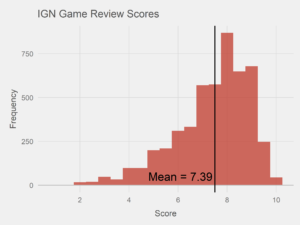The State of Video Game Journalism : Part 1

The State of Video Game Journalism
Perhaps you have found yourself asking these questions;
- Why do Video Game Journalists always give positive reviews and scores?
- Why are some journalists so bad at games?
- How does the Video Game Journalist Industry make money?
Let’s jump right in! Any big company like IGN, Kotaku, Eurogamer thrive because of exclusive content which is provided by Studios and Publishers. Getting exclusive content or pre-release information pushes game journalists above the rest.


Why is that? Well it is simple!
When a new game is announced and you decide to google “Metal Gear of Total War Solid 6 : The Phantom’s Battle of Dutymon Go”. Those who have exclusive deals are going to appear first in search results. Regardless of the actual content of whatever the journalists types up or presents.
The Studio / Journalist Mutual Partnership
The Major Video Game Journalism and Studios/Publishers are a partnership. The Journalists give a good review in return for exclusive content. The Studios give exclusive content to give get good reviews.
If you don’t give us good reviews. Then we really don’t want you to criticise our future games so don’t expect special treatment.


If you are video game journalist who gives out honest reviews and scores all the time and I am a Studio releasing a game. I want assurance of positive press because that would give my game the best chance of succeeding. . Then it would be irresponsible of me to give you alpha footage, screenshots or interviews for the games I produce.
IGN Game Review Scores

Take a look at the graph above. The average score for IGN across their reviews is 7.39. You can be pretty sure that if you are a big company that IGN will be favourable towards you.


What about the bad scores? Whether they are bad games or not doesn’t matter to IGN. Almost any game with what is considered a negative score, which is below 6, is a game that belongs to a studio that the journalist seeks a long lasting relationship with. Alternatively it’s a game from a big publisher but the game itself is not one of their major titles.
But let’s take a look at some of those games to give you an idea of how the scores are rigged.
A Look at the Scores
The score is important to big video game journalists and studios. The content of the review isn’t. As an example. Super Lucky Tales reviewed by [WHO] had a complaint about its camera control. There wasn’t much else to the review. It scores a 5.0. You’d think if that was the only fault worth mentioning that it would score higher.


Now I’m not saying Super Lucky Tales was a good game, or bad, and I don’t even expect you to know it. But that’s the point. Games like these make good sacrifices to give negative scores as a way of justifying giving scores of over 7 to every title the big publishers push out.
Another hilarious example is Assassin’s Creed Liberation which scored 7 on release and 5 for its HD release. Apparently when a game becomes HD the higher resolution textures really highlights the flaws of the game. A HD remake isn’t something that Ubisoft is banking on though so it’s okay to leave it a negative score. I’d have to ask that does a HD remake of a 2 year old game really need a review?
The answer is it’s an easy way to give out a negative score as “proof” that they don’t only give out positive ones.



Fortnite is scoring a 9.6. I think we can agree that this is incorrect. As much fun as Fortnite may be. From a creative, artistic or technical standpoint. This game is does not deserve such a high score. The message is clear though. IGN wants to win points with Epic Games and to please the majority of fans that like Fortnite.
“Hey, We’re one of you! We’re cool too! Read our Content!”
It’s a dark reminder that you can’t just say why something is good or bad. Why we may like something or why we may not. To explain or educate or to try and motivate a push for more exciting and thrilling games.
That the easiest way to be a successful journalist or reviewer is to say the games with the biggest audience and who are likely your readers, that “Their games are good and you are right to like them!”.


Not here though. As I hope you now know part of the secret of modern day journalism and how it has evolved. It actually mimics the old movie and music industry in the days of magazines. My music teacher was in a semi famous band, not that I would know but the other classmates seem impressed and knew him, and he reiterated the same thing.
The publishers and journalists co-operated with each other and this was more beneficial than if the Journalists reviewed with purity.

 Switch to the Discord
Switch to the Discord










